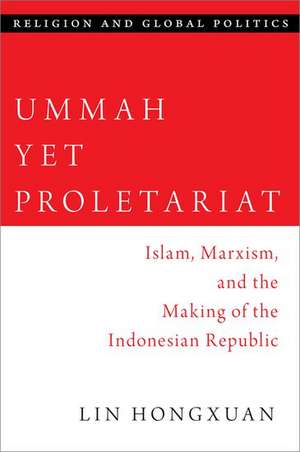Ummah Yet Proletariat: Islam, Marxism, and the Making of the Indonesian Republic: RELIGION AND GLOBAL POLITICS SERIES
Autor Lin Hongxuanen Limba Engleză Hardback – 20 dec 2023
Preț: 446.48 lei
Preț vechi: 614.20 lei
-27% Nou
Puncte Express: 670
Preț estimativ în valută:
85.45€ • 88.88$ • 70.54£
85.45€ • 88.88$ • 70.54£
Carte disponibilă
Livrare economică 13-19 martie
Livrare express 08-14 martie pentru 111.66 lei
Preluare comenzi: 021 569.72.76
Specificații
ISBN-13: 9780197657386
ISBN-10: 0197657389
Pagini: 368
Ilustrații: 11 black and white figures, 1 map
Dimensiuni: 242 x 162 x 28 mm
Greutate: 0.66 kg
Editura: Oxford University Press
Colecția OUP USA
Seria RELIGION AND GLOBAL POLITICS SERIES
Locul publicării:New York, United States
ISBN-10: 0197657389
Pagini: 368
Ilustrații: 11 black and white figures, 1 map
Dimensiuni: 242 x 162 x 28 mm
Greutate: 0.66 kg
Editura: Oxford University Press
Colecția OUP USA
Seria RELIGION AND GLOBAL POLITICS SERIES
Locul publicării:New York, United States
Recenzii
This is one of the most important studies of Islam and Marxist thought published in the past few years—not just in Indonesia, but in scholarship on the entire Muslim-majority world. The book will achieve, I believe, a significant readership in Indonesian and Southeast Asian studies...[and also] among the much larger community of students and scholars interested in the turgid but fascinating history of Islam and Marxism in the modern Muslim world, an interest that is today growing. This book addresses timely issues-and does so with a wealth of documentation and a clarity of argument. In sum—this is an outstanding book.
This book retrieves a history that is unimaginable in today's Indonesia—a history of Muslims seeing themselves as Marxists, of Marxists seeing themselves as Muslims, and all manner of Indonesian nationalists combining Islam and Communism in new and unexpected ways. Lin, with a comprehensive grasp of the print culture of the decades from the 1910s to the 1960s, vividly recreates a lost world whose sense of creativity still holds the promise of inspiring a different future for Indonesia.
Ummah Yet Proletariat is a richly illuminating study of Indonesian societies in which Muslims reconciled Islam and Marxism theoretically and in their material lives. Lin Hongxuan meticulously analyses Indonesian-Malay materials and recounts much-needed histories of left-wing Islamic reform as well as Islamic and Marxist labour movements, print culture and parliamentary politics. Accessibly written, this book is a remarkable addition to the study of modern Indonesia and Islam, reminding us that Indonesia should be central to conversations regarding Asian Marxism and Islamic Third Worldism.
This book retrieves a history that is unimaginable in today's Indonesia—a history of Muslims seeing themselves as Marxists, of Marxists seeing themselves as Muslims, and all manner of Indonesian nationalists combining Islam and Communism in new and unexpected ways. Lin, with a comprehensive grasp of the print culture of the decades from the 1910s to the 1960s, vividly recreates a lost world whose sense of creativity still holds the promise of inspiring a different future for Indonesia.
Ummah Yet Proletariat is a richly illuminating study of Indonesian societies in which Muslims reconciled Islam and Marxism theoretically and in their material lives. Lin Hongxuan meticulously analyses Indonesian-Malay materials and recounts much-needed histories of left-wing Islamic reform as well as Islamic and Marxist labour movements, print culture and parliamentary politics. Accessibly written, this book is a remarkable addition to the study of modern Indonesia and Islam, reminding us that Indonesia should be central to conversations regarding Asian Marxism and Islamic Third Worldism.
Notă biografică
Lin Hongxuan is Senior Tutor in the Department of Southeast Asian Studies at the National University of Singapore. In 2022, he was a Visiting Fellow at the Saw Swee Hock Centre for Southeast Asian Studies, London School of Economics and Political Science. A scholar of Indonesian history, his work has been published in Southeast Asian Studies, Studia Islamika, Positions: Asia Critique, and New Mandala.


